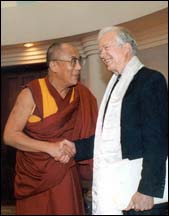 The Norwegian Nobel Committee has decided to award the Nobel Peace Prize for 2002 to Jimmy Carter, for his decades of untiring effort to find peaceful solutions to international conflicts, to advance democracy and human rights, and to promote economic and social development.
The Norwegian Nobel Committee has decided to award the Nobel Peace Prize for 2002 to Jimmy Carter, for his decades of untiring effort to find peaceful solutions to international conflicts, to advance democracy and human rights, and to promote economic and social development. During his presidency (1977-1981), Carter's mediation was a vital contribution to the Camp David Accords between Israel and Egypt, in itself a great enough achievement to qualify for the Nobel Peace Prize. At a time when the cold war between East and West was still predominant, he placed renewed emphasis on the place of human rights in international politics. Through his Carter Center, which celebrates its 20th anniversary in 2002, Carter has since his presidency undertaken very extensive and persevering conflict resolution on several continents. He has shown outstanding commitment to human rights, and has served as an observer at countless elections all over the world. He has worked hard on many fronts to fight tropical diseases and to bring about growth and progress in developing countries. Carter has thus been active in several of the problem areas that have figured prominently in the over one hundred years of Peace Prize history. In a situation currently marked by threats of the use of power, Carter has stood by the principles that conflicts must as far as possible be resolved through mediation and international co-operation based on international law, respect for human rights, and economic development. Oslo, 11 October 2002 Norwegian Nobel Institute Drammensveien 19, N-0255 Oslo, Norway Website: www.nobel.no (Link to be opened in new window). |
|
BOES.ORG International Campaign to Ban Landmines (ICBL) ICBL NGO-links Carter Center cartercenter.org |
Laureates 2004: Wangari Maathai. For her contribution to sustainable development, democracy and peace. She thinks globally and acts locally. 2003: Shirin Ebadi, Iran, 1947-. Lawyer and human rights activist, for her efforts for democracy and human rights. She has focused especially on the struggle for the rights of women and children. 2002: Jimmy Carter, USA, 1924-. For his decades of untiring effort to find peaceful solutions to international conflicts. 2001: The prize was divided equally between: The United Nations ( U.N.) and its Secretary-General, Kofi Annan, Ghana, 1938- For their work for a better organized and more peaceful world. 2000: Kim Dae Jung, Republic of Korea, 1925-. For his work for democracy and human rights in South Korea and in East Asia in general, and for peace and reconciliation with North Korea in particular. 1999: Doctors Without Borders (Médecins Sans Frontières) In recognition of the organisation's pioneering humanitarian work on several continents. 1998: The prize was divided equally between: John Hume, Northern Ireland, 1937-; and David Trimble, Northern Ireland, 1944-. For their efforts to find a peaceful solution to the conflict in Northern Ireland. 1997: The prize was divided equally between: International Campaign to Ban Landmines (ICBL) and Jody Williams, USA, 1950-. 1979: Mother Teresa, India, 1914-1997. Leader of the Order of the Missionaries of Charity. |
|
|